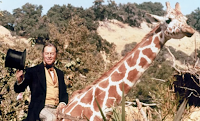In the 19th
century, you could be a nature lover and go off on a jolly expedition blasting
animals with your shotgun. Perfectly normal. You might also be a taxidermist (handy), preserve your little
friends in formaldehyde,
or be a dab hand at jamming pins through beetles. All very respectable, and a
noble pursuit of scientific knowledge.
 |
| Photo credit: UCL UK |
Find it, kill it, own it
seemed to be the Edwardian and Victorian ethos: a childish drive to collect and possess.
This still goes on today among trophy hunters, but these days naturalists are
more focused on preserving wildlife in its context (or what’s left of its
context).
This change seemed to begin in the 20th century, but even then naturalists were such busybodies. It was as if they’d emerged
from their childhood of pulling the wings off flies and developed some empathy,
but they still just couldn’t leave the animals alone.
Gerald
Durrell for instance, a very engaging writer, conservationist and educator. But
he had some strange ideas about wild animals as pets.
Amazing for kids obviously (I would have loved
it), but a huge disservice to the animals (if I’d been that sloth I would’ve been really annoyed). And Gavin Maxwell, what a terrible egotist. I was
captivated by Ring
of Bright Water as a child, but when I read the book as an adult I
was horrified by his determined mistreatment of otter after otter, as he tried
to domesticate them and bend them to his will.
And then there were the Adamsons. Born free indeed. Couldn’t she have just got a tabby?
 |
| Photo credit: Hermann Tirler |
And then there were the Adamsons. Born free indeed. Couldn’t she have just got a tabby?
Why do we do
this to animals? Maybe it’s all the childhood literature, the way we’re brought
up to think of animals as fictional
characters, with human traits. Little
friends to have tea parties with. Is that what those naturalists were acting out,
while they thought they were ‘doing science’? What kind of ego buzz were they
getting from pestering wild animals and believing they had a special rapport?
They were like emo teenagers, “nobody understands me – except animals.”
 |
| George, Elsa, Joy. Photo credit: Classic Safaris Africa |
You have to ask, was it doing the animals any good? Did it do the
natural world any good? It would be fair to say these mid-century tv shows,
books and movies
influenced a generation of kids, and made them more
conservation minded than their parents. But I think it skewed
our perspective on what respect for the natural world really entails.
 |
| Dr Dolittle. Photo Credit: 20th Century Fox |
There were other naturalists of course, more interested in context, and education.
Jacques Cousteau inspired a generation of marine biologists,
they are just everywhere these days. And
of course there’s David Attenborough – a more gentlemanly naturalist altogether,
but still, not above getting too hands-on with the wildlife.
But I worry that time is running out for us to finally grow up, and
learn to appreciate animals in their own habitat, valuing them as part of the
fabric of the world rather than for the uses we can put them to, or the emotions
we can project onto them.
Sometimes I wonder
if naturalists like David Attenborough are just the same as the Victorians,
really. Still collecting. Wanting to categorise and record every little thing,
every part of the planet. There’s a sadness and nostalgia that permeates
Attenborough’s later work, as if he’s getting ready to say goodbye to this
beautiful world. Or as if he knows this beautiful world, that he has so
lovingly explored and catalogued, is saying goodbye to us. He’s been
quoted as saying that humans are like ‘a plague on earth’. And he’s seen more
of it than any of us - he should know.
Plenty of food for thought in this beautifully written post, Liz.
ReplyDeleteIn the past I've thought hard about the urge to collect, but I still don't understand it; however, your post has prompted new ideas, so thank you.
Don't be too hard on Attenborough, though. That photograph originates decades ago, and he's recently on record as renouncing the idea of handling animals in his documentaries. I think his repudiation's in one of the special features additions to a recent documentary series, but I'm afraid I don't remember which one, and I'm trying to finish marking assignments ;-(
It's not Attenborough but the others like Steve Irwin, Nigel Marven, and Dominic Monaghan (who should have stuck to acting rather than molesting animals) who get my goat (so to speak). The hypocrisy of those kinds of presenters, as they grab(bed) and stress(ed) out the animals they profess to love, appalls me.